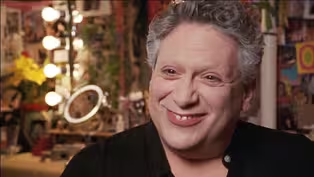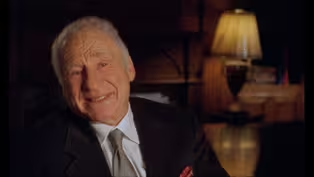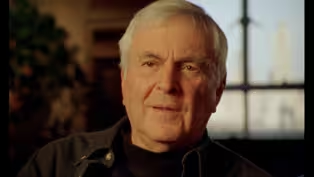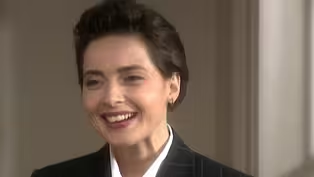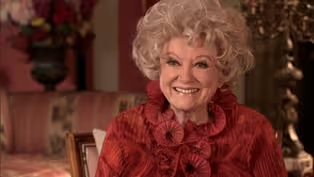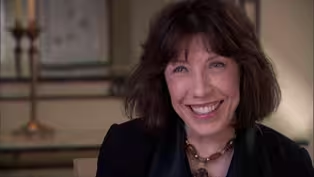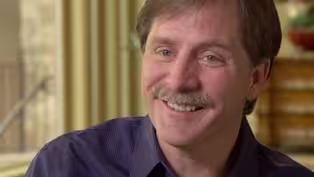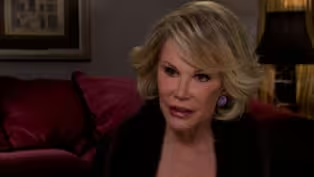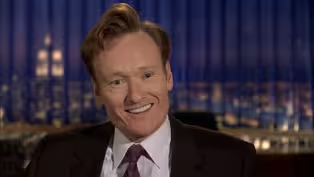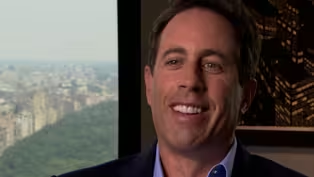
Paul Mooney on his career and relationship with Richard Pryor
Special | 10m 39sVideo has Closed Captions
Paul Mooney reflects on the mechanics of stand-up and his role as Richard Pryor's best friend.
On April 6, 2007, Paul Mooney reflected on the mechanics of stand-up comedy and his unique role as best friend to comedy’s all-time greatest, Richard Pryor. Interview conducted by director Michael Kantor for the six-hour PBS comedy series, “Make ‘Em Laugh: The Funny Business of America” (2009).
Problems playing video? | Closed Captioning Feedback
Problems playing video? | Closed Captioning Feedback
Support for American Masters is provided by the Corporation for Public Broadcasting, AARP, Rosalind P. Walter Foundation, Judith and Burton Resnick, Blanche and Hayward Cirker Charitable Lead Annuity Trust, Koo...

Paul Mooney on his career and relationship with Richard Pryor
Special | 10m 39sVideo has Closed Captions
On April 6, 2007, Paul Mooney reflected on the mechanics of stand-up comedy and his unique role as best friend to comedy’s all-time greatest, Richard Pryor. Interview conducted by director Michael Kantor for the six-hour PBS comedy series, “Make ‘Em Laugh: The Funny Business of America” (2009).
Problems playing video? | Closed Captioning Feedback
How to Watch American Masters
American Masters is available to stream on pbs.org and the free PBS App, available on iPhone, Apple TV, Android TV, Android smartphones, Amazon Fire TV, Amazon Fire Tablet, Roku, Samsung Smart TV, and Vizio.
Buy Now
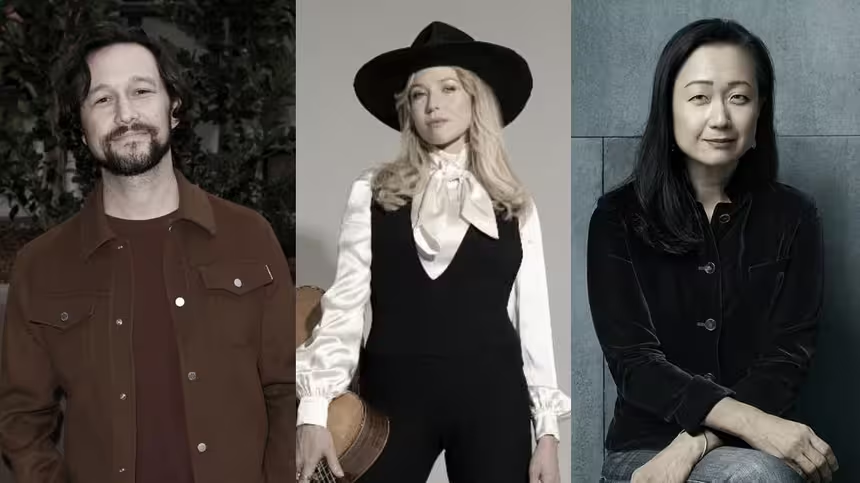
A front row seat to the creative process
How do today’s masters create their art? Each episode an artist reveals how they brought their creative work to life. Hear from artists across disciplines, like actor Joseph Gordon-Levitt, singer-songwriter Jewel, author Min Jin Lee, and more on our podcast "American Masters: Creative Spark."Providing Support for PBS.org
Learn Moreabout PBS online sponsorshipMore from This Collection
Watch curated interviews from The American Masters Digital Archive. The full collection includes over 1,000 hours of never-before-seen, raw interviews: a treasure trove of the movers and shakers of American culture, including Maya Angelou, Patti Smith, Mel Brooks, Carol Burnett, Matthew Broderick, Carl Reiner, Joan Rivers, Dionne Warwick, Lee Grant, Sidney Lumet, Betty White and many others.
Harvey Fierstein on gay representation on Broadway and its deep history
Video has Closed Captions
Harvey Fierstein talks to director Michael Kantor backstage during the production of "Hairspray." (13m 8s)
Video has Closed Captions
Ringo Starr describes his friendship with Mae West. (10m)
Mel Brooks' wild ride to his first Broadway show ever
Video has Closed Captions
Mel Brooks talks about the first Broadway show he ever saw—Cole Porter's "Anything Goes." (5m 44s)
John Kander and Fred Ebb on “Cabaret,” creativity and collaboration
Video has Closed Captions
Composer John Kander and lyricist Fred Ebb talk about how they have worked together. (5m 56s)
Isabella Rossellini compares her acting and modeling
Video has Closed Captions
Isabella Rossellini discusses her acting versus modeling career. (28m 24s)
Quincy Jones explains how he got started in music
Video has Closed Captions
Quincy Jones discusses his early career, friendships and how he defines himself. (15m)
How Phyllis Diller broke down the doors for female comics
Video has Closed Captions
Phyllis Diller reflects on how her comedy was a response to years of “take my wife” jokes. (11m 35s)
How Lily Tomlin found liberation in exploring her Laugh-In characters
Video has Closed Captions
Lily Tomlin speaks about her time on Laugh-In and how she developed her characters. (12m 35s)
Jeff Foxworthy on how every American might be a "redneck"
Video has Closed Captions
Jeff Foxworthy discusses regionalism in comedy and why "redneck" is a state of mind. (15m 41s)
Joan Rivers finds humor in being yourself
Video has Closed Captions
Joan Rivers speaks about her experience as a female comic in the early 60s. (9m 59s)
Conan O’Brien gets serious about silliness
Video has Closed Captions
Conan O’Brien speaks about his style of late night and his reason for doing comedy. (15m 32s)
Jerry Seinfeld on his place in American sitcom history
Video has Closed Captions
Jerry Seinfeld discusses his collaboration with Larry David and the evolution of the sitcom. (16m 1s)
Providing Support for PBS.org
Learn Moreabout PBS online sponsorship- There's a lot of people who use standup to open a door.
Michael Keaton did it.
I mean, I got a list.
I can name 'em for you.
They're not really standups.
They learn the art of it.
Like a bird, they learn to imitate it to get attention, but they have other ulterior motives.
But the true standup, the true ones that are brilliant, it's innate.
It comes from upstairs.
They're born that, and they're gonna be that, whether they're born in Japan or Germany or Africa or Louisiana or Mississippi.
They're gonna be that comic.
It's like being a vampire.
It's like being born a vampire.
Nothing's gonna stop 'em from being that.
I started writing comedy when I was about eight years old.
I used to get in trouble when I went to school.
My mother had to come and prove that I wasn't plagiarizing, that I didn't steal it because it was funny.
You know, so?
But I knew it.
And I also knew the power of comedy and speech and timing.
Timing's everything and I knew it.
I remember once I was in high school and this was in Berkeley, California.
I was born in Louisiana in the south.
And a teacher had made a comment to me, and the teachers, that's their stage.
That's their standup.
A lot of them are frustrated stands ups, and they like all that attention from the class.
I mean, they're very dominating and they don't want you to share it or take it from 'em.
And I had a lot of trouble 'cause all the kids would want the teacher to shut up and let Paul tell the stories.
You know, we wanna hear Paul's stories, not yours.
So they made the teachers hate me.
But anyway, I was in a science class, I was in high school, and the teacher said, I forget what the exact thing, but he said, "Listen, this is a science class.
This is not like a mechanics class or something.
We don't do that here," and put me in my place.
And, at that time, if I'd have talked back to him, I'd have got in trouble.
So timing's everything.
I waited like three months and he told me to get up and shut the back door.
And I said, "Get up and shut your own back door."
He said, "What did you say?"
I said, "You don't understand English?
You heard me.
Shut your own back door.
This is a science class.
It's not a domestic class."
The class screamed with laughter because they remembered what he had did.
And all he could say to me was, he said, "Touche."
And that ended it.
But if I'd have done it that day, I'd have got in trouble.
So timing means everything.
I was a teenager, but it still means everything.
I was in the military and I was in Fort Ord.
We were being trained.
And there was a little Filipino guy, I mean, they would tell you with your weapon up, down, you know, down to the ground, stand up.
He couldn't coordinate.
And whenever we would be down, he'd be up.
And whenever we'd be up, he'd be down.
And the sergeants come on real strong.
And the sergeant said, "Listen," he told the Filipino guy, "If I say down and you're up, I'm gonna put my foot so far you're behind."
You know how they talk in the military, you know.
It scared the guy to death.
And he said, "Down," and everybody was down, but I was standing up and the sergeant said, "Why are you up?
Why are you standing up?"
I said, "Because you said you're gonna put your foot so far up his behind and I didn't wanna miss it."
Well, they all started laughing.
And so I was able to do it.
And I was always, in real life, funny.
People would tell me how funny I was.
And I was writing.
And I started out working with other people.
I mean, doing plays.
I was with a black improvisation group, when improvisation was a big deal, in San Francisco called the Yankee Doodle Bedbugs.
And I went from there to Chicago and I got with the Improv.
Well, I'm lucky because I get to wear different hats, you know.
I get to act, and be in the background and write, you know, and then be in the forefront and perform.
And I get to wear many hats, so maybe that was a good thing.
And I mean, I've played nursemaid to a lot of druggies.
I mean, from Richard Pryor, which was my best friend and who I love very dearly.
And Flip Wilson, Redd Foxx.
I mean, it's a list of them.
My grandmother raised me and I think like an old lady from Louisiana.
No drugs, no cigarettes.
I mean, it was back in the day when cocaine was really cocaine and was pure and expensive.
And I used to be in limos with all the entertainers and the Motown people.
I mean, I don't wanna tell on everybody, but they used to pass thousand dollar bills around with cocaine on and they'd snorted it.
That was a very hip thing to do.
And when it got to me, I'd wipe off the dope and put it in my pocket.
And nobody knew where the money was 'cause they're all too high to remember who had it.
And people come and tell you about these people, you know, and said, you should be like this one or you should try to see them because you'll really be impressed.
And I'd heard about Richard Pryor from Joe and Eddie.
They were like the Smothers Brothers, the black Smothers Brothers.
And one of them was killed in the automobile accident.
I went to school with them.
And they had saw Richard work in New York, and they came and told me about him.
And I was staying with my half-sister in a cheap apartment on Sunset and Hollywood.
Richard was dating a girl that worked at the telephone company who was moonlighting and dancing with my sister at one of the clubs, I think the Whiskey a Go Go, during that whole Motown era.
And Richard came to the hotel with her to pick us up.
And that was during the late '60s when the whole Bob, what was it, Bob something when they all got in bed together.
- [Speaker] Bob, Carol, Ted, Alice.
- Yeah, and Lassie or whatever.
I mean, that was during that time when that free love thing.
So Richard said, "Well, why don't we all just get into bed and have sex?"
And I put him out of the room, out of the apartment, I mean.
I put him out.
I didn't like him.
And then two weeks later we met again at a Trini Lopez concert in West Hollywood.
And the rest is history.
We had a drink, we talked, we laughed.
You know, I was his biggest fan.
Lone Ranger and Tonto, Lucy and Ethel.
I mean, we were the perfect match.
I mean, because I was a writer, Richard was a writer, and I was a performer, Richard was a performer.
I loved my work.
I mean, I have a passion for it.
Richard had a passion for it.
I loved writing stuff with him.
I loved writing stuff, giving it to him.
And then I used to get off on watching the material, him say it.
I used to get off on that.
And if you listen to all of his old albums, you'll hear me laughing real hard.
You'll hear my laughter.
He was really fascinated with Bill Cosby 'cause Bill Cosby did what they called the crossover.
And Richard really wanted that, and we used to discuss that, and I used to tell Richard how Bill Cosby couldn't hold a candle to him.
I mean, Richard was a complete genius.
And I mean, nothing against Bill, but he just was.
I mean, Marilyn Monroe was in love with Jean Harlow and all Jean Harlow did was not wear a bra.
She couldn't hold a candle to Marilyn Monroe.
And it happens like that sometime, you know?
And then Richard just worked himself out of it.
It's like a cocoon.
You know?
He was a caterpillar who became his own butterfly, and he finally got the message of who he was.
Richard and I used to get together on purpose just to break all the rules.
And it wasn't NBC.
Everyone keeps saying, you know, Richard was on drugs and they couldn't handle him.
They couldn't...
They loved every second of it because suddenly these people in suits, they were like vampires until Richard came along.
Now they could get outta the coffin and walk around and bite people.
They loved it.
They could get on the phone, they could, you know, stand this and practice, and this and this and Richard did that and we were gonna do this.
And it was their blood.
They were alive.
And they had a job.
They actually had a job.
And it was just, it was crazy.
I mean, it kept me up 24 hours.
Richard gave me the ultimate power.
Richard said, "The talent we need, Paul works with 'em all at The Comedy Store.
If Paul says they can do it, they can do it.
Don't audition them."
That was a first for Hollywood.
Hollywood likes the hype of the audition.
There was no audition.
And I brought in Sandra Bernhard, Robin Williams.
No one knew who these people were.
Robin, no one knew who they were.
No one.
Johnny Witherspoon, Tim Reid, Marsha Warfield.
And NBC didn't know these people at all.
And I used to help the director of the show then.
I used to help him with the comedians, because comedians are weird and if you don't handle them right, they'll shut down.
The minute they don't get that, whatever it is, they'll back off and they won't be funny.
And I had to tell the director how to get the funny out of them because I knew them.
They were my own, you know, we're like vampires.
They were my own kind.
So I knew what to do and what to say to them.
Plus, Richard had given me all that power.
And I was writing, I was doing all this stuff.
And then I was dealing with Richard and I begged Rocco, I said, "Rocco just let me off.
I have to get off a day.
I have a family.
I gotta go pay my bills."
One day I got off, I stayed away for about eight hours and I came on the set and Rocco was waiting for me at the gate.
And the look on his face, he said, "You can never leave this set again."
He said Richard flipped when I wasn't there.
He flipped.
And sometimes Richard would get so high, he wouldn't come out the dressing room and we'd have to wait.
So me trying to be the best friend and the best for Richard and trying to make sure the show was the best, I took all the liquor outta Richard's dressing room and I fed it to the audience 'cause they were there so long and I didn't know, you know, it was the law.
The studio wanted to murder me.
You can't give liquor to the audience because if they're drunk and they leave the studio and they get an accident or whatever, the studio's responsible.
So they flipped out on me, but I got everybody drunk.
But nobody got hurt.
But it was great.
I went by his house one day.
He said, "Paul, help me because I can't think of a name of my new album and is there something I said?"
And I said, "Well, the best thing about you, they used to burn witches for saying and doing things, and they're gonna put you to stake and do you the same way."
So he put it on his album.
I think Richard had demons within himself to find out who he was as a comic.
I used to tell him all the time who he was.
And he would say sometimes to me, "I'm not Martin Luther King.
I can't have that responsibility."
I said, "You have it whether you want it or not.
You've been chosen.
It's the way it is."
He would say, "My shoulders aren't that broad.
I can't carry everyone like that."
I said, "But you have to."
I said, "Because an audience will walk on water for you to come see you."
I was sitting out there.
I saw him differently from what he saw himself.
His grandmother, who he loved dearly, was a madam in a whorehouse.
And his mother was a prostitute and the father was a pimp.
So Richard saw and heard things a child shouldn't have seen or heard.
You know, but I think that's part of it too.
That's what makes the genius of an artist.
(gentle music)
Support for PBS provided by:
Support for American Masters is provided by the Corporation for Public Broadcasting, AARP, Rosalind P. Walter Foundation, Judith and Burton Resnick, Blanche and Hayward Cirker Charitable Lead Annuity Trust, Koo...

